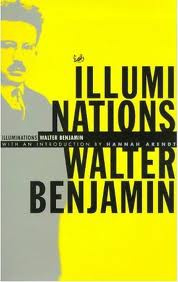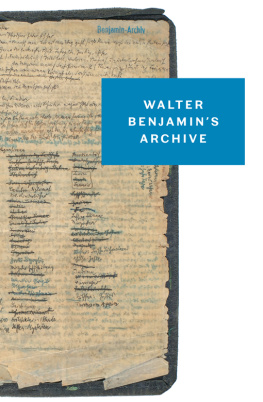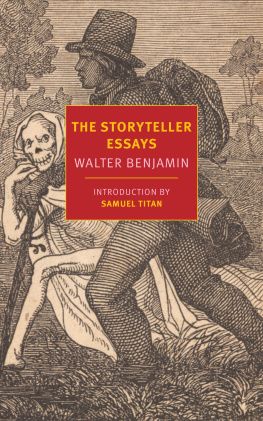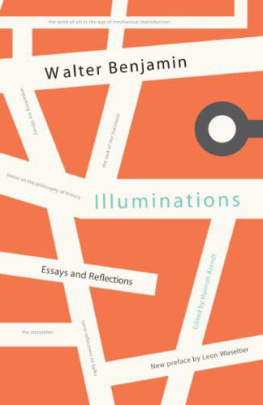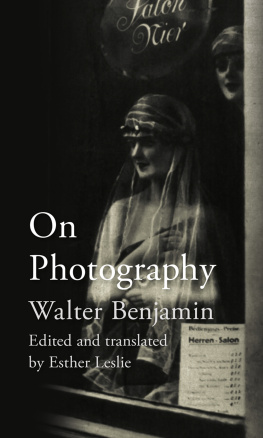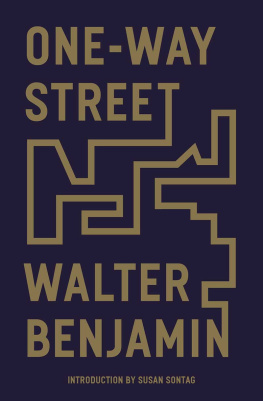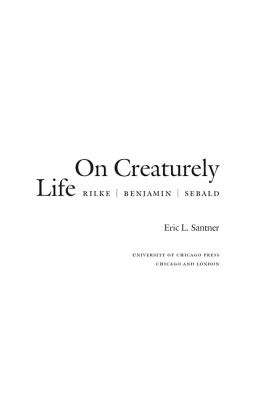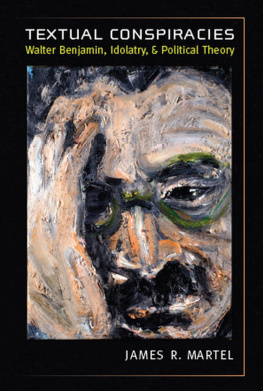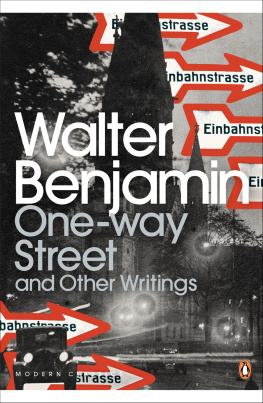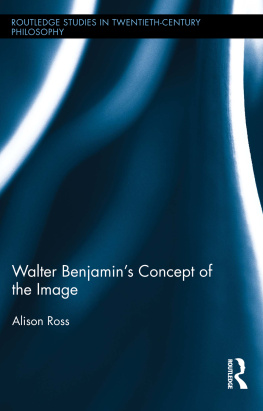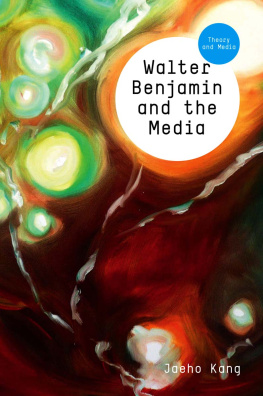Walter Benjamin - One-Way Street
Here you can read online Walter Benjamin - One-Way Street full text of the book (entire story) in english for free. Download pdf and epub, get meaning, cover and reviews about this ebook. year: 2016, publisher: The Belknap Press of Harvard University Press, genre: Detective and thriller. Description of the work, (preface) as well as reviews are available. Best literature library LitArk.com created for fans of good reading and offers a wide selection of genres:
Romance novel
Science fiction
Adventure
Detective
Science
History
Home and family
Prose
Art
Politics
Computer
Non-fiction
Religion
Business
Children
Humor
Choose a favorite category and find really read worthwhile books. Enjoy immersion in the world of imagination, feel the emotions of the characters or learn something new for yourself, make an fascinating discovery.

- Book:One-Way Street
- Author:
- Publisher:The Belknap Press of Harvard University Press
- Genre:
- Year:2016
- Rating:4 / 5
- Favourites:Add to favourites
- Your mark:
- 80
- 1
- 2
- 3
- 4
- 5
One-Way Street: summary, description and annotation
We offer to read an annotation, description, summary or preface (depends on what the author of the book "One-Way Street" wrote himself). If you haven't found the necessary information about the book — write in the comments, we will try to find it.
One-Way Street — read online for free the complete book (whole text) full work
Below is the text of the book, divided by pages. System saving the place of the last page read, allows you to conveniently read the book "One-Way Street" online for free, without having to search again every time where you left off. Put a bookmark, and you can go to the page where you finished reading at any time.
Font size:
Interval:
Bookmark:
ONE-WAY STREET
WALTER BENJAMIN
TRANSLATED BY
Edmund Jephcott
EDITED AND WITH AN INTRODUCTION BY
Michael W. Jennings
PREFACE BY
Greil Marcus
The Belknap Press of Harvard University Press
Cambridge, Massachusetts London, England
2016
This work is a translation of a selection from Walter Benjamin, Gesammelte Schriften, unter Mitwirkung von Theodor W. Adorno und Gershom Scholem, herausgegeben von Rolf Tiedemann und Hermann Schweppenhuser, copyright 1972, 1974, 1977, 1982, 1985, 1989 by Suhrkamp Verlag.
One-Way Street originally appeared in English in Walter Benjamin, Reflections, edited by Peter Demetz, translated by Edmund Jephcott.
English translation copyright 1978 by Harcourt Brace Jovanovich, Inc.
Published by arrangement with Houghton Mifflin Harcourt Publishing Company.
Preface copyright 2016 by Greil Marcus.
Introduction and notes copyright 2016 by the President and Fellows of Harvard College.
ALL RIGHTS RESERVED
Cover design: Graciela Galup
Cover art: Erwin Piscator entering the Nollendorftheater, Berlin 1929 (detail). Gelatin silver print by Sasha Stone, courtesy the National Gallery of Art, gift of Henrick A. Berinson and Adam J. Boxer. Ubu Gallery, New York.
978-0-674-05229-1 (alk. paper)
978-0-674-54592-2 (EPUB)
978-0-674-54591-5 (MOBI)
The Library of Congress has cataloged the printed edition as follows:
Names: Benjamin, Walter, 18921940, author. | Jephcott, E. F. N., translator. | Jennings, Michael William, editor, writer of introduction. | Marcus, Greil, writer of preface.
Title: One-way street / Walter Benjamin ; translated by Edmund Jephcott; edited and with an introduction by Michael W. Jennings; preface by Greil Marcus.
Other titles: Einbahnstrasse. English
Description: Cambridge, Massachusetts : The Belknap Press of Harvard University Press, 2016. | Translated from the German. | One-Way Street? originally appeared in English in Reflections by Walter Benjamin. | Includes bibliographical references and index.
Identifiers: LCCN 2015039382
Subjects: LCSH: Aphorisms and apothegms. | Epigrams. | Philosophy, German20th century.
Classification: LCC PN6283 .B413 2016 | DDC 838/.91209dc23 LC record available at http://lccn.loc.gov/2015039382
In Memoriam
MIRIAM BRATU HANSEN
19492011
- by Greil Marcus
- by Michael W. Jennings
Greil Marcus
One day in 1924, a German man in his early thirties steps into a European street. Businesses, shops, signs, public announcements: in the two years that it takes him to reach the end of the street, he notes everything that catches his eye, until the outlines of a city come into view.
Filling Station
Breakfast Room
Number 113
For Men
Standard Clock
Come Back! All Is Forgiven!
Manorially Furnished Ten-Room Apartment
Chinese Curios
Gloves
Mexican Embassy
To the Public: Please Protect and Preserve These New Plantings
Construction Site
Ministry of the Interior
Flag
at Half-Mast
Imperial Panorama
Underground Works
Coiffeur for Easily Embarrassed Ladies
Caution: Steps
Attested Auditor of Books
Teaching Aid
Germans, Drink German Beer!
Post No Bills
Number 13
Ordnance
First Aid
Interior Decoration
Stationers
Fancy Goods
Enlargements
Antiques
Watchmaker and Jeweler
Arc Lamp
Loggia
Lost-and-Found Office
Stand for Not More than Three Cabs
Monument to a Warrior
Fire Alarm
Travel Souvenirs
Optician
Toys
Polyclinic
These Spaces for Rent
Office Equipment
Mixed Cargo: Shipping and Packing
Closed for Alterations
Stamp Shop
Si Parla Italiano
Technical Aid
Hardware
Tax Advice
Legal Protection for the Needy
Doctors Night-Bell
Madame Ariane: Second Courtyard on the Left
Costume Wardrobe
Betting Office
Stand-Up Beer Hall
No Vagrants!
To the Planetarium
At the same time, in Paris, a man in his mid-twenties enters the Passage de lOpra, and, as if sighting the first mans itinerary from across their borders in advance, subsumes his long list down to essentialsFor Men, Coiffeur for Easily Embarrassed Ladies, and Stamp Shopand catches them all, catches all of life, in a single glimpse.
Two hairdressers follow the stamp dealer in single file, the first a ladies hairdresser, the second a Salon for Gentlemen. The specializations involved in your functions as hairdressers to the two sexes are by no means lacking in pungency. The laws of the world are inscribed in the letters across your shop fronts.
A few years after that, in 1930, a Berlin filmmaker cuts hundreds of street soundsmachines starting up, men talking, policemen blowing whistles, children asking questions, doors closing, bells gonging, women singing, pianos playing, with whistling, percussion, or cuckoo clock noises framing it allinto a rhythmic eleven-minute movie without images (it may have been screened as such in a theater), a radio play in which, from then to now, any inhabitant of any industrialized nation could instantly find a place.
Almost fifteen years later, in 1944, a German refugee from the Third Reich, living in Los Angeles, drawn like the first man to a philosophy of names and phrases, begins another map, using philosophical fortune cookies instead of commercial shingles.
Articles may not be exchanged
Baby with the bath-water
Plurale tantum
Tough Baby
To them shall no thoughts be turned
English spoken
On parle franais
Paysage
Dwarf fruit
Pro domo nostra
Cat out of the bag
Savages are not more noble
Out of the firing-line
Johnny-Head-in-Air
Back to culture
The Health unto Death
This side of the pleasure principle
Invitation to the dance
Ego is Id
Always speak of it, never think of it
Inside and outside
Freedom of thought
Unfair intimidation
Just short of ten years after that, again in Paris, a twenty-year-old, a believer in something he and his fellows call psychogeography, looks at the city as if to leap off of the infinity marked by the first mans last sighting and the prolegomenon to all future cataloging of commercial establishments in the second mans last sentence, listing the most suggestive street names the city has given up.
Bains-Douches des Patriarches
Machines trancher les viandes
Zoo Notre-Dame
Pharmacie des Sports
Alimentation des Martyrs
Bton translucide
Scierie Main-dor
Centre de recuperation fonctionnelle
Ambulance Saint-Anne
Cinquime avenue caf
Rue des Volontaires Prolonge
Pension de famille dans le jardin
Htel des Etrangers
Rue Sauvage
Et la piscine de la rue des Fillettes. Et le commissariat de police de la rue du Rendez-vous. La clinique medico-chirurgicale et le bureau de placement gratuity du quai des Orfvres. Les fleurs artificielles de la rue du Soleil. Lhtel des Caves du Chteau, le bar de lOcan et le caf du Va et Vient. Lhtel de lEpoque.
Like others before them and after (Thomas De Quinceys explorations of London in Confessions of an English Opium-Eater in 1821, Ed Ruscha with his photo-book Every Building on the Sunset Strip in 1966, Laura Oldfield Ford with her excavations of a ruined London hidden in plain sight in her zine Savage Messiah from 2006 to 2009), these fiveWalter Benjamin, with One-Way Street, written between 1924 and 1926 and published in 1928; Louis Aragon, with The Passage de lOpra, written in 1924 and published as the first chapter of his
Next pageFont size:
Interval:
Bookmark:
Similar books «One-Way Street»
Look at similar books to One-Way Street. We have selected literature similar in name and meaning in the hope of providing readers with more options to find new, interesting, not yet read works.
Discussion, reviews of the book One-Way Street and just readers' own opinions. Leave your comments, write what you think about the work, its meaning or the main characters. Specify what exactly you liked and what you didn't like, and why you think so.


